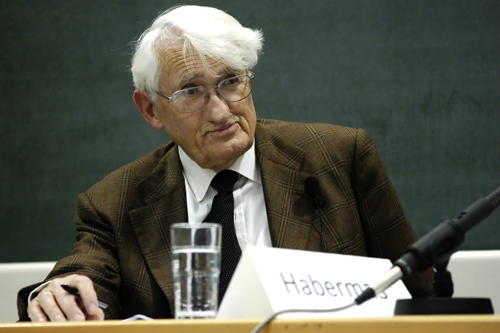
Your complimentary articles
You’ve read one of your four complimentary articles for this month.
You can read four articles free per month. To have complete access to the thousands of philosophy articles on this site, please
Philosophical Haiku
Jürgen Habermas (1929-)
by Terence Green
From speech comes reason.
Discourse of modernity,
Enlightenment’s heir.

Jürgen Habermas © Wolfram Huke 2008 Creative Commons 3
Jürgen Habermas represents those for whom the ideals of the Enlightenment remain actual possibilities. In other words, he rejects the claim of post-modernists (such as Lyotard) that the Enlightenment project has failed: there remains, Habermas argues, the potential for a fully rational and scientific understanding of our world. We should, he says, “try to hold on to the intentions of the Enlightenment, feeble as they may be.”
For Habermas, the key to greater rationality in politics is to revitalise the moribund public sphere. This was once where ideas could be debated until some form of consensus would arise; but in the modern world, the public sphere has all but ceased to exist: we are no longer active citizens engaged in a shared enterprise of politics – we are passive consumers engaged in the self-centred pursuit of pleasure. And to the extent that the public sphere remains, it has become a site of rivalry between factions competing for the state’s resources. This alienation from democracy is compounded by the representative nature of our democracies – our involvement in politics is limited to electing our representatives, and this distances us from the decision-making practices, in which we ought to be directly engaged. But this, says Habermas with optimism, can all be changed.
What’s required is what he terms an ‘ideal speech situation’. Here citizens equipped with equal capacities for speech, of equal social standing, and self-critical enough to avoid error, confusion, and the distortions of ideology, would meet and discuss matters until a rational consensus was achieved. This, claims Habermas, would represent both the triumph of reason and the practice of true democracy, since it would be direct democracy, in which citizens use the process of deliberation to achieve consensus. Overly optimistic? Many think so. But then philosophers have never tended to let the real world get in the way of a good theory.
© Terence Green 2025
Terence Green is a writer, historian, and lecturer who lives in Eastbourne, New Zealand.









